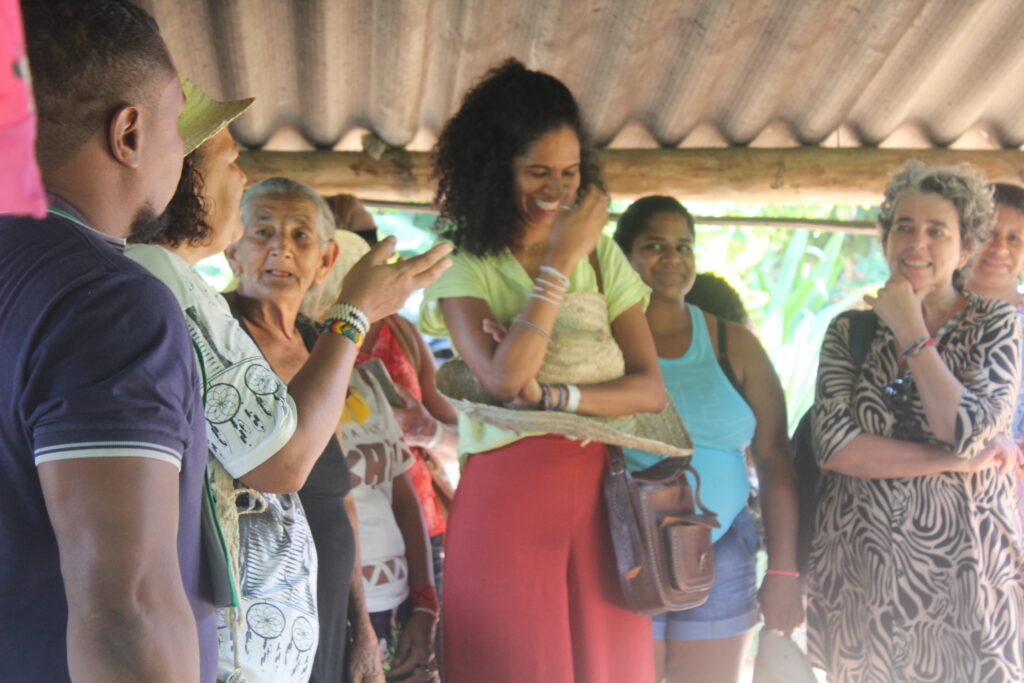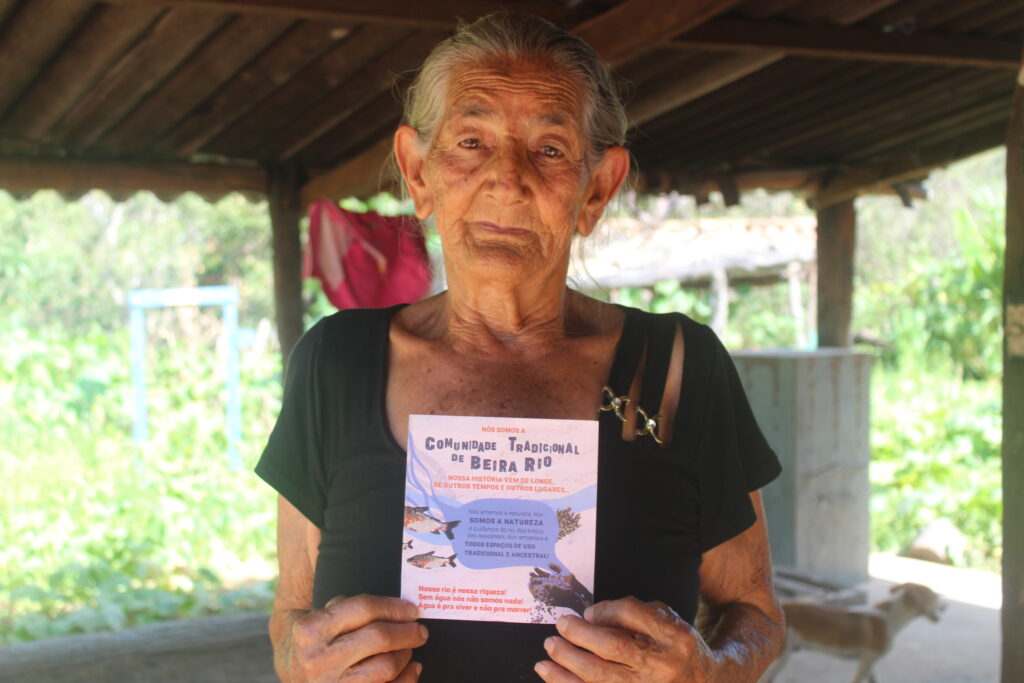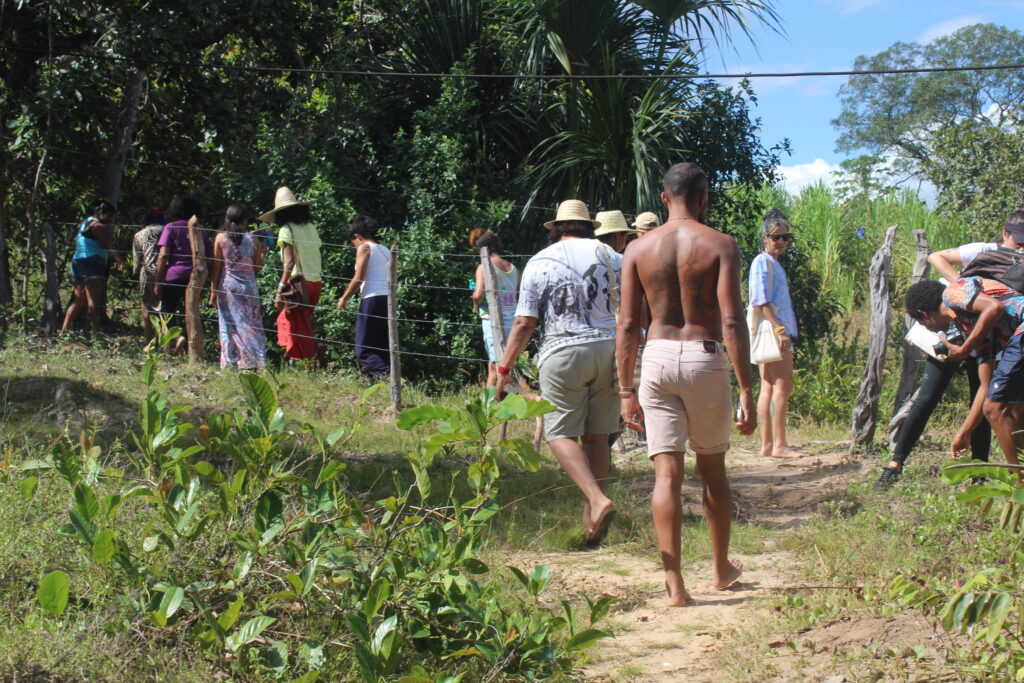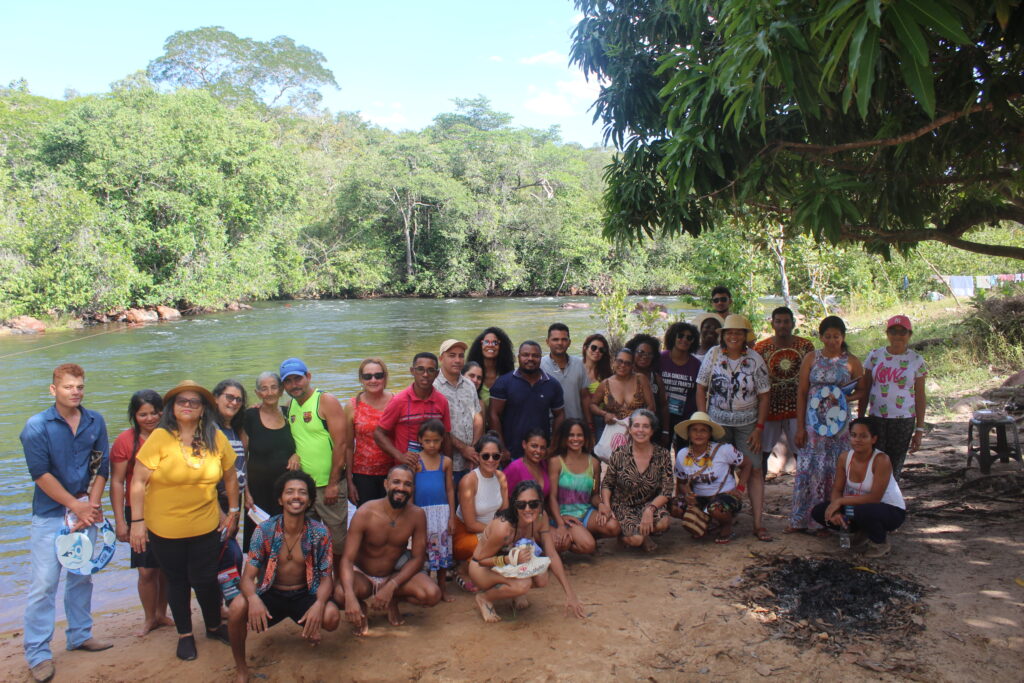
“We can hear the sound of the river from here. But we can also hear the machines and every one of them hurts.” These are the words of one the leaders of the Beira Rio community in São Desidério (Bahia). For years, these people have fought against the installation of a Small Hydroelectric Power Plant (Pequena Central Hidrelétrica: PCH) designed to divert approximately 80% of the water from the Rio Grande for the profit of a single company, ignoring the existence of the riverine populations in the region.
The community was one of those visited by the group that participated in the workshop, “In the Rapids of Resistance: gender and race in the territories of the Cerrado”, run in Barreiras between 9 and 11 May by CESE, in partnership with the 10envolvimento Agency and supported by HEKS-Eper and Bread for the World. The aim of the activity was to establish an arena for reflection about the impacts of racism, sexism and capitalism on the MATOPIBA regions of the Cerrado, as well as to find out more about the water conflicts in these territories.
In all the talks, from the group’s exchange with the community of São Desidério to the debates held during the workshop, State operations against the traditional peoples and communities of these regions were clear. International Labour Organization (ILO) Convention 169 obliges governments to consult these people in cases such as the PCH, but the riverine leaders from Beira Rio stated that this did not happen.



In 2013, technical advisors for the Institute for the Environment and Water Resources (Instituto de Meio Ambiente e Recursos Hídricos: INEMA) issued a notification stating that the enterprise was unfeasible and rejecting its application for a location license, emphasizing the socio-environmental impacts. However, months later INEMA itself published an ordinance granting a Preliminary License. The company was only able to obtain an Implementation License in 2018. And it was only one year later, when the company began to rent houses for its workers in a neighbouring community, that the communities found out about the PCH installation.

Several cases were discussed during the workshop. Complaints principally concentrated on a lack of inspection, whereby a small-scale fisherman or woman is severely punished for cutting down a small patch of mangrove, while the State permits the massive destruction of territories for large-scale enterprises. Strategies to exclude communities from the relevant debates have also been reported.
In criticising the installation of a shipyard in a Bahian town, shellfish picker Vânia Conceição Sacramento, from the National Coalition of Fisherwomen (Articulação Nacional das Pescadoras: ANP), reported that the public hearings to debate these works were held in the early hours, to prevent people from participating. Fernanda Souza, from the Artisanal Fishermen and Women’s Association (Associação de Pescadores Artesanais) of the Rio Grande Basin, classified what is happening to the riverine population as “water grabbing”.
Wagner Kraho Kanela reported that the water from the rivers that flow through his people’s Indigenous Land all go into the crops and come back poisoned by pesticides sprayed by plane. One participant from Correntina outlined several cases in which land grabbers have sold the lands of people from the communities, who only discovered the scam when they received notification that their house had been mortgaged.
Gender and Race in the territories of the Cerrado
On 11 May, four women were invited to share their experiences and perceptions of the importance of the women’s struggle to keep the Cerrado and its socio-biodiversity on their feet. These were: Quilombola Camila Pereira dos Santos, from the Barra do Parateca Quilombo; indigenous woman Luciana Kiriri, from the Kiriri Barreiras Village; Conchita Silva, from the Collective of Women for the Cerrado in the West of Bahia (Coletivo de Mulheres pelo Cerrado do Oeste da Bahia), and Beatriz Blackman, from the Black Women’s Network for Food and Nutrition Sovereignty and Security (Rede de Mulheres Negras para Soberania Segurança Alimentar e Nutricional: RedeSSAN).
Camila is the president of her community association and heads up work with women aimed at family farming. She described how this process started with two women, but today there are 35 women in the group. In general, these are women who face difficult personal issues, which is why the main highlight she mentioned touched on their trajectory and the autonomy they have gained.
“Everything starts small, right? And it was like that with them. We’ve already seen the transformations in their family incomes, which have risen. At the beginning, it was an achievement for them just to be able to buy some cream for their daughters, to pay for a health test with money earned from their own sweat. These are small things, but they gave us a broader view of what else they could achieve through family farming. When you have autonomy, you grasp what you are capable of,” she noted.
Conchita talked about the women’s different forms of struggle and resistance and the fallacy that they don’t participate in confrontations. “In the CPT’s ‘Land Conflicts’ booklets, they always say that women are the first affected, because they remain in the territories. A colleague of mine had to leave town because of threats. His mother stayed on and was harassed by land grabbers, visited by the police. Isn’t this the struggle?”
Conchita described a case, taken from a report in an old newspaper, of a woman whose two-month old baby fell out of her arms when she was surprised by a land grabber who invaded her house on a horse – the baby later died – and once again she asked, “Isn’t this the struggle?”
Luciana said that today it’s not only the Kiriri Barreiras village that is entirely led by women, since they were the ones who fought to conquer it. “At a crucial time for the village’s land regulation, in the final stretch, the women came together and took the lead, imposing their authority on the men too. Today we are on the frontline, the women have their own handicrafts and income to participate in mobilizations.”
As well as reflecting that the bodies of women are their first territories, Beatriz questioned how the gender debate is going with the men. “These arenas generally address the women’s point of view, because we have historically been silenced, but how do men construct this thinking? How do they discuss it, seriously, in their circles?”
She added, “As women ,our bodies are our first territories. We fight to protect them but we need our companions in this fight too. It doesn’t make sense to defend the land and attack this other territory – which is our bodies.”
In the Rapids of Resistance
The workshop “In the Rapids of Resistance: gender and race in the territories of the Cerrado” was attended by groups, organizations, movements and certain networks from the Cerrado, from the states of Maranhão, Piauí, Bahia and Tocantins. The workshop was run by Olga Matos and Marcella Gomez, Projects and Training Advisors at CESE and by Amanda Silva, Agent for Development at the NGO 10envolvimento Agency.
At another point in the training, the groups discussed the principal confrontations and strategies for resistance and networking that have marked their activities within their communities. The debate also focused on issues of Land and Territory, Territories of Water and Young People, and Public Policies.

